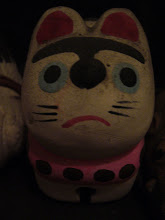日本ではまだSNSユーザーの割合は少ないです。ネットへの接触が早かった米国レベルまではまだ時間がかかりそうですが、韓国、英国、豪州の今の程度ぐらいまではここ数年で広がるでしょう。SNSのユーザーの大部分が20-35歳ですので、そのグループ層へ更なる浸透及び20歳以下及び35歳以上のユーザーが増加は必至、これらをターゲットにしたSNSも増えてくるでしょうね。携帯電話は、低年齢・高齢の方向けにボタン・機能を減らしたものが出ました。SNSもシンプルなものがでるかも/もう出ているかもしれません。
The percentage of SNS user against the total internet user in Japan is small compared with the other developed countries e.g. the US, Korea, UK and Australia. Japanese SNS market has room to grow at least like Korea and Australia which welcomed the internet age after the US. Say the majority of SNS user is 20-35yo, the new SNS may target below 20 and above 35. The mobile phone got simpler when it targeted the junior and senior citizens. The similar trend may be seen (or perhaps already being seen) in the new SNS service.
found one SNS 「 http://www.eons.com/ 」targeting baby boomers with an obituary notice function. too obvious focus..ちょっと探してみますと、こんなのがありました。 これはベイビーブーマーをターゲットにしたSNSで訃報がとどく機能があるとか、やりすぎ感ありますね。
Interesting to note, SNS user percentage in the total internet user tends to be higher for the emerging markets. It is because for these markets the total internet user tends to be younger than others. For example, 30% of the total population of China is the net user and that percentage for Korea and Japan is around 80% where the age group in the net user group is presumably wider than in China.
便利なデータがありました。興味深いのは、イマージング市場は母数のネット人口の大多数は若いと考えられ、SNSユーサーの割合は高くなる傾向があります。中国は全人口の30%がネットユーザーで若者から高齢の方までおしなべてネットユーザーが分布しているとは考えにくいです。韓国や日本の場合は人口の80%前後がユーザーですから、現在の人口年齢分布を考 えても幅広い層にネットユーザーがいると考えられます。
Net user Asia top 10 countries:
1. China: 420,000,000 (31.6% of the population in the country)
2. Japan: 99,143,700 (78.2%)
3. India: 81,000,000 (6.9%)
4. South Korea: 39,440,000 (81.1%)
5. Indonesia: 30,000,000 (12.3%)
1. China: 420,000,000 (31.6% of the population in the country)
2. Japan: 99,143,700 (78.2%)
3. India: 81,000,000 (6.9%)
4. South Korea: 39,440,000 (81.1%)
5. Indonesia: 30,000,000 (12.3%)
(Internet World Stats, January 2011)
